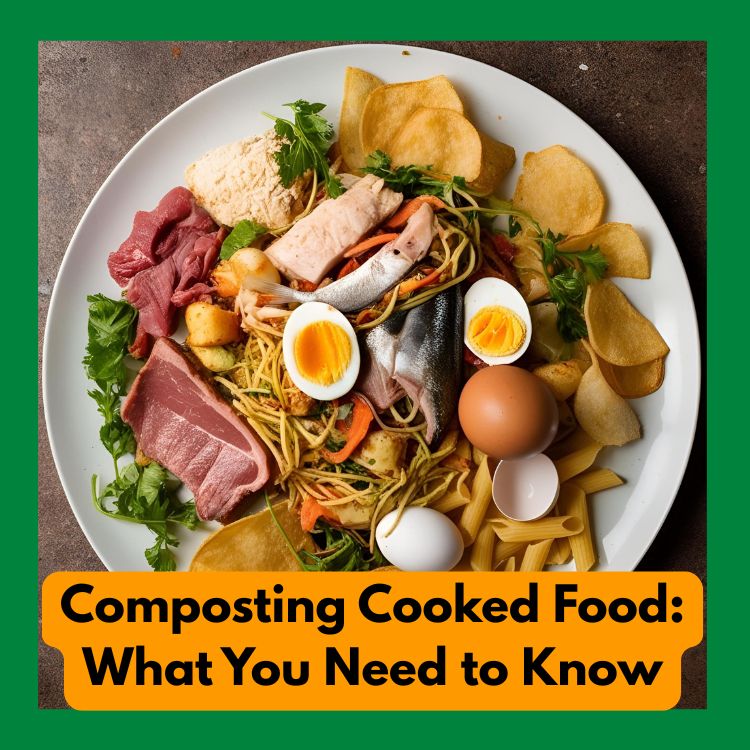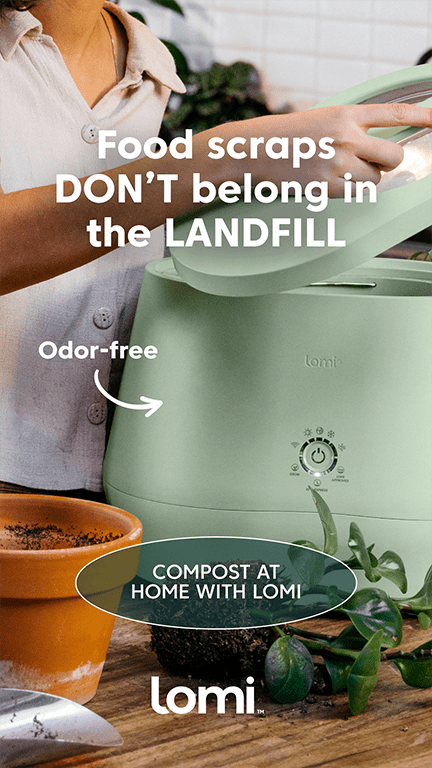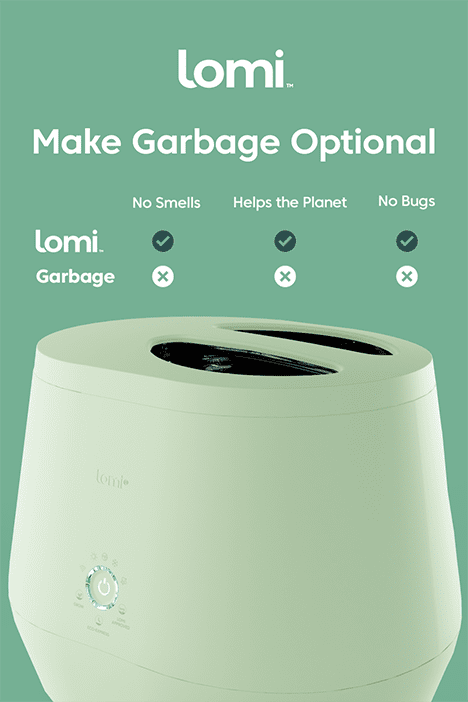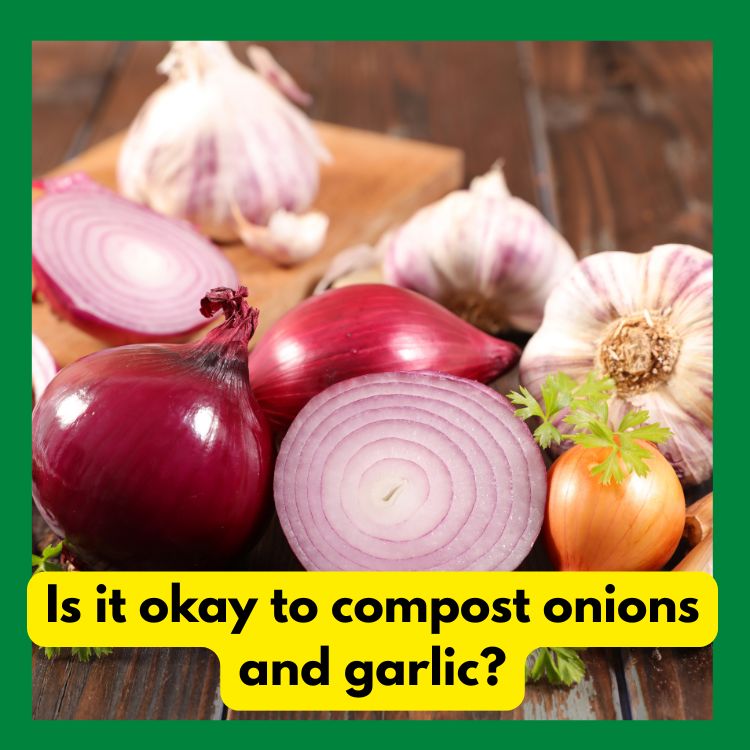Can you compost cooked food?
If you have ever wondered Can you compost cooked food? Then this is for you.
Find out the do’s and don’ts and how simple to follow rules will help your compost
In an ideal world, food waste wouldn’t be a concern. But, knowing how to compost cooked food is a valuable skill. It can greatly reduce waste.
There are many composting systems out there. Bokashi bins, Green Johanna, and wormeries can handle cooked food waste.
This makes it easier to manage kitchen scraps and leftovers.
Key Takeaways
- Composting cooked food reduces waste and supports sustainable living.
- Bokashi bins, Green Johanna, and wormeries are effective composting systems for handling cooked food waste.
- Composting cooked food is a simple and environmentally friendly way to manage kitchen scraps.
- Reducing food waste through composting is a crucial step towards a more sustainable lifestyle.
- By composting cooked food, you can significantly decrease the amount of waste sent to landfills.
My Journey into Food Waste Composting
My Journey into Food Waste Composting
My journey into food waste composting started when Yasmeen from the Dry Goods Store in London tweeted about it.
This sparked my interest in composting kitchen scraps. It’s a great way to cut down on waste.
Why I Started Composting Kitchen Scraps
I started composting to reduce our household waste and make nutrient-rich soil for my garden. It’s a way to lessen landfill waste and learn about decomposition.
My Initial Concerns and Hesitations
At first, I worried about pests and bad smells from composting kitchen scraps.
But learning the right techniques made me confident in composting.
Composting kitchen scraps is easy. You just collect waste, add it to a bin or pile, and keep it right. The secret is knowing what you’re composting, keeping the right mix, and making sure it’s moist and airy.
By composting, we can cut down on waste, lower our environmental impact, and make a valuable resource for our gardens.
As I kept composting, my soil got better, making my garden healthier and more productive.
In conclusion, composting kitchen scraps is a simple yet effective way to manage waste, improve soil, and reduce our environmental impact.
It’s a positive step for the environment and makes our gardens healthier and more productive.
Can You Compost Cooked Food? The Basic Facts
Cooked food can indeed be composted. But, it’s important to know the challenges and how to handle them well.
Common Misconceptions About Composting Cooked Food
Many think cooked food can’t be composted. But, with the right steps, it can be done effectively.
The Science Behind Decomposing Cooked Foods
The breakdown of cooked food depends on several factors. It usually has a lot of carbon and less nitrogen.
Learning about composting cooked food helps you add it to your compost pile successfully.
My Composting Experiment: The Setup
To start composting cooked food, I had to plan carefully.
I picked the right equipment, chose the cooked food to test, and figured out how to track the composting.
Materials and Equipment Used
First, I picked a compost bin. I looked at a bokashi bin, Green Johanna, and wormery. Each had its own needs for setup and care.
My Compost Bin Selection Process
I chose a bokashi bin for my experiment. It’s great for cooked food. I thought about ease of use, controlling odors, and keeping pests away.
Tools and Accessories
I also got tools like a compost aerator and moisture meter. They help keep the composting right.
Types of Cooked Food I Tested
I tested different cooked foods. This included plant-based leftovers, grains, and starches. I wanted to see how they broke down and affected the compost.
- Cooked vegetables
- Rice and pasta
- Bread and baked goods
Monitoring Methods and Documentation
To track the composting, I used several methods. I checked it regularly, took temperature readings, and documented my findings.
By setting up my experiment and watching it, I learned a lot. I figured out how to keep a compost bin in good shape and manage a compost pile.
This helped me learn how to compost cooked food well.
What Cooked Foods Work Well in Compost
Exploring composting kitchen scraps, I found some cooked foods are perfect for compost. It’s a great way to cut down on landfill waste and make soil rich for gardening.
But, not all cooked foods are good for composting.
Plant-Based Cooked Foods: My Success Stories
Plant-based cooked foods are great for compost. They’re full of nutrients and break down fast.
Vegetables and Legumes
Cooked veggies and legumes are top choices for compost. They’re packed with nitrogen, phosphorus, and potassium, boosting soil health.
Adding cooked veggies like broccoli and beans to my compost has made my garden soil better.
Fruits and Baked Goods
Fruits and baked goods, like bread, can also go into compost. They’re full of carbs and draw in good microbes.
But, mix them with other stuff to avoid smells.
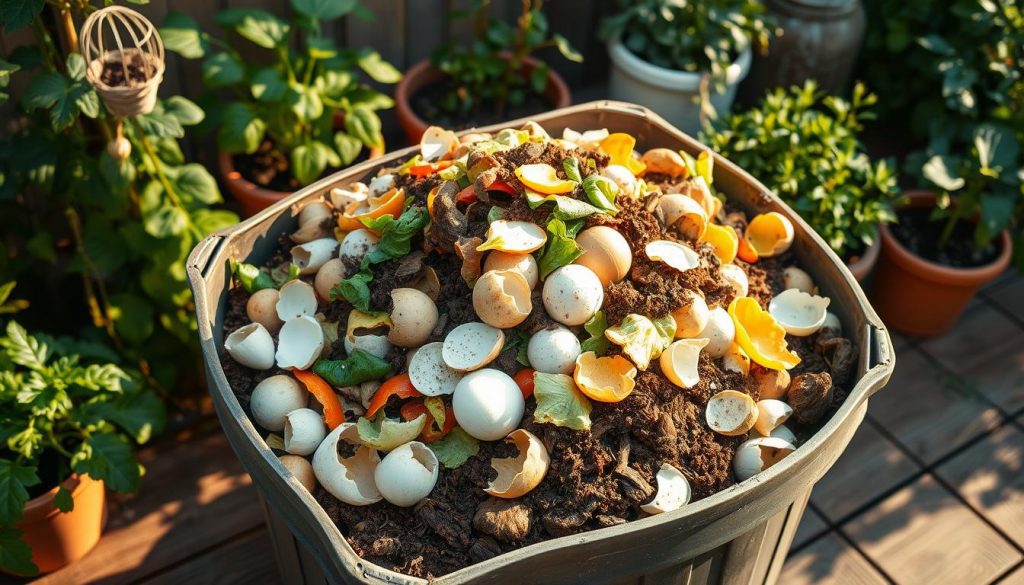
Grains and Starches: Decomposition Observations
Grains and starches, like rice and pasta, can also be composted. They’re high in carbon, balancing out the compost.
I’ve seen they decompose slowly, so chop them up before adding.
| Cooked Food | Decomposition Rate | Nutrient Value |
|---|---|---|
| Vegetables and Legumes | Fast | High in N, P, K |
| Fruits and Baked Goods | Moderate | Rich in Carbohydrates |
| Grains and Starches | Slow | High in Carbon |
In conclusion, adding the right cooked foods to your compost can make it better. Focus on plant-based foods and mix different materials.
This way, you’ll get a compost that’s good for your garden.
Cooked Foods to Avoid in Your Compost Pile
Composting kitchen scraps sounds good, but some cooked foods can be bad news. They might attract pests, smell bad, or mess up the composting process.
Knowing which cooked foods to skip is key to a healthy compost pile.
Meat and Dairy Products: My Failed Attempts
I thought composting meat and dairy would be smart. But it turned out to be a big challenge.
These foods are full of protein and fat, drawing pests and causing bad smells.
The Odor and Pest Problems I Encountered
Decomposing meat and dairy made a stinky mess that pests loved. It was a real nuisance and could be unhealthy.
Decomposition Rates and Issues
Meat and dairy take forever to break down. They often don’t fully decompose, leaving pathogens in the compost.
Oily and Fatty Foods: Lessons Learned
I also tried composting oily and fatty foods like fried stuff and oils. But they gummed up the compost pile, stopping other stuff from breaking down right.
This could lead to bad conditions without air.
Here’s a quick rundown of the problems with different cooked foods:
| Food Type | Issues Encountered | Impact on Compost |
|---|---|---|
| Meat and Dairy | Odor, Pests, Slow Decomposition | Health Risks, Nuisance |
| Oily and Fatty Foods | Anaerobic Conditions, Coating Other Materials | Poor Decomposition, Potential for Pathogens |
By not adding these foods to your compost, you can keep your pile healthy and avoid problems.
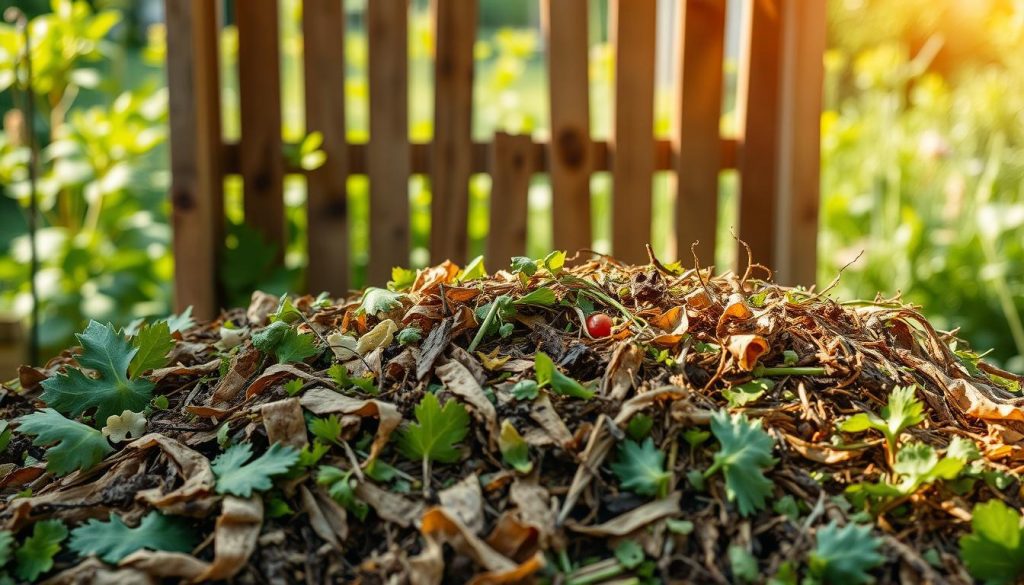
Managing Potential Problems with Composting Kitchen Scraps
Composting kitchen scraps can be rewarding but comes with challenges. Issues like bad smells, pests, and too much moisture need attention.
Managing these problems is key to a successful compost.
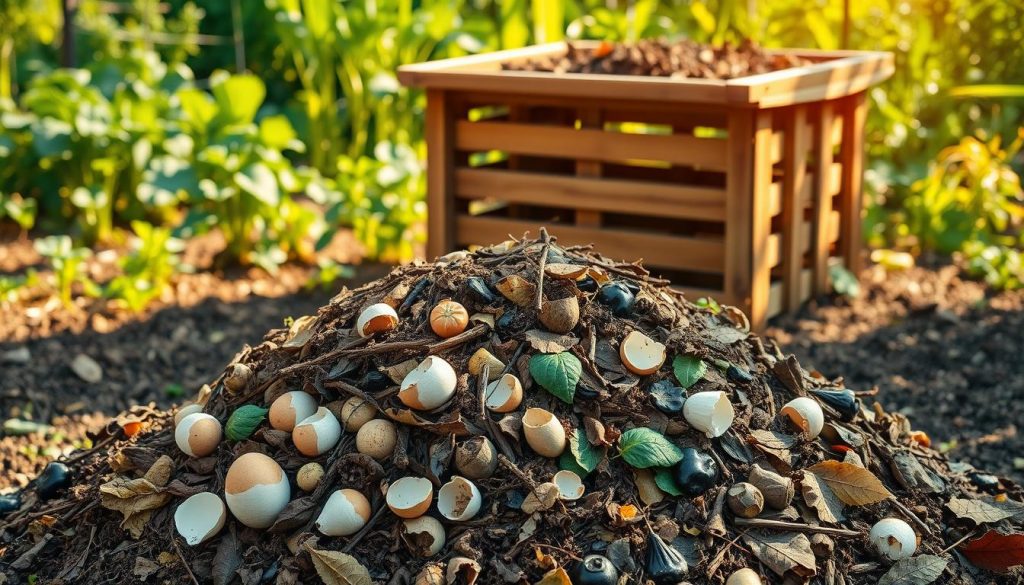
Dealing with Odors: My Trial-and-Error Solutions
Odors are a big concern when composting kitchen waste. I found that adding “brown” materials like dried leaves or newspaper helps.
Turning the compost pile regularly also cuts down on smells by letting in air and speeding up breakdown.
Tom Smith, a seasoned composter, said, “Keep a balance of ‘green’ and ‘brown’ materials to avoid bad smells.”
His advice has been very helpful for me.
Preventing Pest Infestations: What Worked for Me
Pests can be a big problem if not handled right. To keep pests away, I buried new kitchen scraps under compost or brown materials.
This simple trick keeps pests from finding the food waste.
- Regularly check the compost pile for pests
- Don’t add meat, dairy, or oily foods that pests like
- Keep the carbon-to-nitrogen ratio balanced
Balancing Moisture Levels in Different Seasons
Moisture changes with the seasons. In dry times, I keep a close eye on moisture and add water as needed.
In wet times, I make sure the compost gets enough air to avoid being too wet.
By using these methods, I’ve kept my compost healthy. It turns kitchen scraps into rich soil for my garden.
Good compost pile management is essential for success.
Accelerating the Decomposition Process
I’ve learned a few simple ways to speed up composting cooked food. These tips have been key in making nutrient-rich compost for my garden.
Preprocessing cooked food before adding it to the compost pile is crucial.
It makes the decomposition faster and more efficient.
Chopping and Crushing Techniques I Developed
Chopping and crushing cooked food scraps into smaller pieces has changed my composting game. It increases the surface area, allowing microorganisms to break down the organic matter quicker.
Using a food processor or blender to chop the scraps before composting can cut down the decomposition time a lot.
For example, chopping vegetable peels and leftovers into fine pieces speeds up their breakdown. It also helps keep the compost pile balanced.
This is a valuable composting tip that I highly recommend.
Adding Activators and Accelerants: My Experiments
I’ve also tried adding activators and accelerants to my compost pile. Things like compost tea, manure, or commercial compost accelerators boost microbial activity.
This speeds up the decomposition process. My experiments show these additives work well with cooked food, helping balance the carbon-to-nitrogen ratio.
For instance, adding a handful of compost tea or a sprinkle of compost accelerator can really help. It stimulates the microorganisms, leading to faster breakdown of organic waste.
This is a practical composting tip for those wanting to improve their composting.
Seasonal Considerations for Composting Organic Waste
Composting changes with the seasons. Knowing this helps keep your composting system working well.
As seasons shift, so do the conditions that affect how waste breaks down.
Summer vs. Winter Composting: My Observations
Summer composting is more active because of the warmer weather. This speeds up the breakdown of waste.
But, it can dry out if not kept moist. Winter composting is slower because it’s colder. You need to be patient and might need to add more effort to keep it going.
Key summer composting tips:
- Make sure the compost pile has enough water by adding it regularly.
- Turn the compost pile often to keep air flowing.
- Watch the temperature to avoid it getting too hot.
In winter, you should:
- Keep the compost pile warm by insulating it.
- Add smaller amounts of materials to slow down the process less.
- Keep a good mix of “green” and “brown” materials.
Adjusting Your Approach Based on Climate: My Regional Tips
Adapting to local climate changes is key. For example, in rainy areas, make sure the compost pile drains well to avoid being too wet.
Regional composting considerations:
- In dry places, water the compost pile more often.
- In humid areas, make sure it gets enough air to avoid mold.
- In places with very hot or cold weather, protect the compost pile from extreme temperatures.
Understanding these seasonal and climate factors helps make composting more effective.
It makes your composting process better and more efficient.
My Compost Bin Maintenance Routine
Keeping your compost bin in good shape is key to a successful composting process. We’ll look at the important tasks and schedule for your compost bin.
This will help keep your compost pile working well and efficiently.
Weekly Tasks and Time Investment
Regular upkeep is crucial for a healthy compost pile. Set aside time each week to check your bin, mix the pile, and add new materials.
Monthly Maintenance Schedule
Don’t forget to do monthly checks on your compost bin.
Look for pests or diseases and take action if you find any.
Seasonal Overhauls and Harvesting Compost
As the seasons change, your compost pile will go through big changes.
Make sure to adjust your maintenance routine to match these changes.
The Results: How My Garden Benefited
Here is the content for section 11 of the article, enclosed in the “ tag:
The Results: How My Garden Benefited
Composting can make a big difference in your garden. It improves soil quality and helps plants grow better. You’ll see the garden’s health and productivity improve.
Soil Quality Improvements: Before and After
Adding composted kitchen scraps to the soil made a big change. It made the soil better at holding water and nutrients. Before, the soil was dense and lacking in nutrients.
But after composting, the soil became more open. This allowed roots to grow better and get more air.
Plant Growth and Yield Changes: My Data
Plant growth and yields really improved. With better soil, plants started to thrive. I saw a big increase in tomatoes and leafy greens.
Before, tomato plants struggled. But after composting, they produced more fruit. Leafy greens grew faster and were denser.
By composting regularly, gardeners can improve soil quality. This leads to healthier plants and more food.
Conclusion: Is Composting Cooked Food Worth It?
After trying composting cooked food, I found it can be worth it. With the right techniques and strategies, many problems can be solved.
This makes composting cooked food a valuable practice.
Some cooked foods like plant-based meals and grains work well in compost. But, it’s important to avoid meat, dairy, and oily foods.
They can attract pests and smell bad.
Composting cooked food needs careful planning and regular upkeep. It also requires being ready to adjust as needed.
This way, people can reduce waste, make good soil, and live more sustainably. When done right, composting cooked food is a great choice for the environment.
By composting food waste, including cooked meals, we help our planet and gardens. With the right steps, composting cooked food is effective and worth it.
It’s a simple way to live more sustainably.
Can you compost cooked food? FAQ
Q: What types of cooked food can be composted?
Cooked plant-based foods like fruit and veggie scraps, grains, and starches can go into your compost.
But, don’t add meat, dairy, or oily foods to your pile.
Q: Can I compost cooked meat and dairy products?
No, it’s best not to compost cooked meat and dairy. They can attract pests and make bad smells.
Q: How often should I maintain my compost bin?
Keeping your compost bin in good shape is key. Do weekly tasks like turning the pile. Also, do a big clean-up every month or season to keep it working well.
Q: What are some tips for accelerating the decomposition process?
To make composting faster, chop and crush your food waste. Adding special helpers can also speed things up.
Try different methods to see what works best for you.
Q: How do I manage potential problems with composting kitchen scraps?
To avoid problems like bad smells, pests, and too much moisture, balance your compost’s carbon and nitrogen levels.
Keep it moist and make sure it gets enough air.
Q: What are the benefits of composting cooked food?
Composting cooked food makes your soil better. It improves soil quality, structure, and fertility. This leads to healthier plants and more food.
Q: Is composting cooked food worth the effort?
Composting cooked food takes some work, but it’s worth it. It helps your garden and the planet. By composting regularly, you reduce waste and make your soil richer.
Check out our article on Onions and Garlic below

